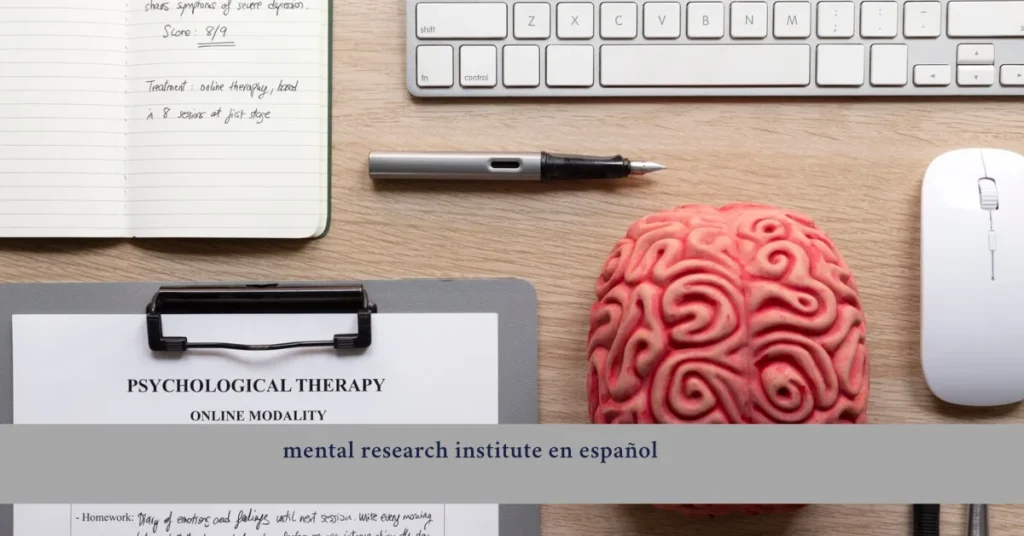Introduction to Mental Research Institute en Español (MRI)
Access to mental health services is essential in our society. However, many communities face significant barriers when trying to seek help. One such community is the Spanish-speaking population, which often feels excluded due to the lack of resources available in their language. This is an area where the Mental Research Institute (MRI) is making a meaningful difference of mental research institute en español.
With a strong focus on emotional and psychological well-being, MRI is committed to providing inclusive and accessible care for everyone. In this blog, we explore how the institute is addressing this critical need and why its Spanish-language services are vital for those seeking emotional support. From inspiring stories to practical advice on finding the right provider, you’ll discover valuable insights into MRI’s efforts to create a welcoming space for all Spanish speakers.
The Importance of Spanish Language Services in Mental Health
Mental health is a crucial part of overall well-being, and communication plays a vital role in accessing care. For many Spanish-speaking individuals, language can be a significant barrier when trying to find support.
Cultural and linguistic differences can lead to misunderstandings between patients and mental health professionals. This not only affects the quality of care but may also discourage individuals from seeking help altogether.
Having services available in Spanish enables a deeper connection between therapist and patient. It creates an environment where individuals can openly express their emotional experiences without language barriers.
Additionally, having trained staff who understand both the language and cultural nuances greatly improves therapeutic outcomes. Empathy is more effectively communicated when words flow naturally and are fully understood.
Benefits of a Spanish-Speaking MRI
Access to care. An MRI that offers services in Spanish allows patients to communicate without language barriers. This is crucial for clearly expressing their concerns and needs.
Trust in treatment. Cultural connection plays a vital role in mental health. Spanish-speaking individuals are more likely to feel comfortable sharing their stories with professionals who understand their language and background.
Better understanding of diagnoses. When receiving information in their native language, patients can better comprehend their diagnoses and treatment plans, leading to more informed decisions about their care.
Personalized interventions. Clear communication allows therapists to tailor interventions to each individual’s cultural context, enhancing the effectiveness of treatment.
Reduction of stigma. Providing services in Spanish helps demystify mental health within Spanish-speaking communities, encouraging more people to seek professional help when needed.
How MRI is Addressing the Need for Spanish Language Services?
The Mental Research Institute (MRI) has taken important steps to address the need for Spanish-language services. The organization recognizes that access to psychological care is crucial for Spanish-speaking communities.
They are implementing specific programs that offer therapy and counseling in Spanish. This ensures that clients not only feel comfortable but also truly understood.
Additionally, MRI is training its professionals in relevant cultural topics. This approach helps remove language barriers and promotes an inclusive environment.
Digital resources also play a key role. Accessible online tools enhance communication between therapists and Spanish-speaking patients.
Through these initiatives, MRI is positioning itself as a leader in the push for equity in mental health, ensuring that everyone has a voice and receives appropriate support—no matter their native language.
Success Stories from Spanish-Speaking Clients at MRI
Ana’s story is truly inspiring. She came to the Mental Research Institute seeking help for anxiety that had been affecting her daily life. Thanks to a Spanish-speaking therapist, she was able to express her emotions freely without any language barriers. Today, Ana actively participates in community activities and feels more empowered than ever.
Another powerful testimony comes from Carlos, who was battling depression after losing his job. At MRI, he found a safe space where he could share his experiences and receive emotional support in his native language. Now, he’s working on a new project and has regained his confidence.
Then there’s Mariana, a mother of two young children. MRI’s family program provided her with practical tools to manage stress and improve communication with her partner. Her home now reflects a sense of harmony and mutual understanding.
Tips for Finding a Quality Mental Health Provider for Spanish-Speaking Individuals
Finding a quality mental health provider can be challenging, especially for Spanish-speaking individuals. Start by searching online directories that specialize in bilingual services. Websites dedicated to mental health often have filters for language capabilities.
Ask friends or family for recommendations if they’ve had positive experiences with providers who speak Spanish. Personal referrals can lead you to compassionate professionals who understand cultural nuances.
Don’t hesitate to inquire about the therapist’s experience with specific issues you may face. It’s essential that they not only speak your language but also grasp the context of your concerns.
Many clinics offer initial consultations, allowing you to gauge comfort levels and communication styles before committing long-term. It’s crucial that you feel understood and valued throughout your journey toward better mental health.
Conclusion and Future Plans for MRI’s Expansion in Spanish Language Services
The Mental Research Institute (MRI) recognizes the vital need for accessible mental health services in Spanish. With a growing demand, they are committed to expanding their offerings to ensure that Spanish-speaking individuals receive the highest quality care. Future plans include increasing bilingual staff and developing tailored programs addressing cultural nuances.
These efforts aim not only to enhance service delivery but also to foster an inclusive environment where all clients feel understood and valued. As MRI progresses, they remain dedicated to supporting the mental well-being of diverse communities through continuous improvement and innovation in Spanish language services. The journey toward greater accessibility is ongoing, with exciting developments on the horizon for those seeking support at MRI.
ALSO READ: Contact Email Eyexcon: Everything You Need to Know
FAQs
What is “Mental Research Institute en Español”?
Answer: “Mental Research Institute en Español” refers to the Spanish-language mental health services offered by the Mental Research Institute (MRI), designed to provide culturally sensitive care for Spanish-speaking individuals and families.
Why are Spanish-language mental health services important?
Answer: Spanish-language services break down communication barriers, foster trust, and allow patients to express their emotions authentically, leading to better therapeutic outcomes.
Who can benefit from MRI’s Spanish-language programs?
Spanish-speaking individuals and families seeking emotional support, therapy, or counseling in a culturally familiar environment can greatly benefit from these services.
How does MRI ensure cultural sensitivity in its Spanish services?
MRI trains bilingual professionals in culturally relevant practices and tailors treatment plans to respect and reflect the cultural background of Spanish-speaking clients.
Are online resources available in Spanish through MRI?
Yes, MRI provides digital tools and online therapy options in Spanish, making mental health support more accessible to Spanish-speaking communities regardless of location.






